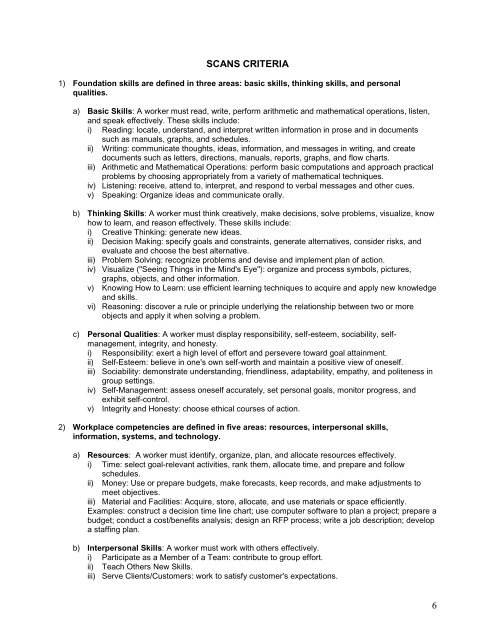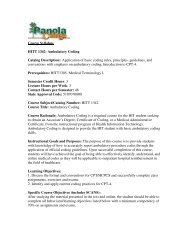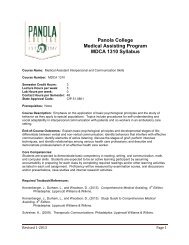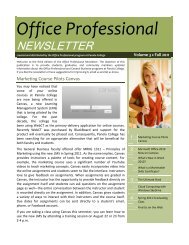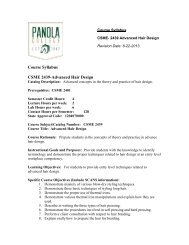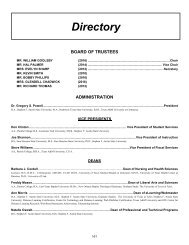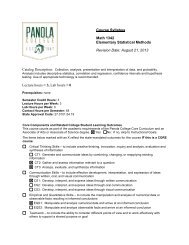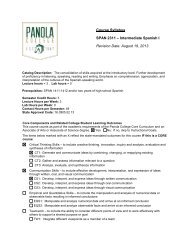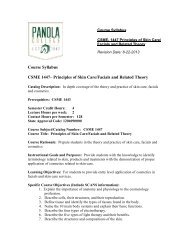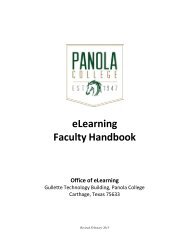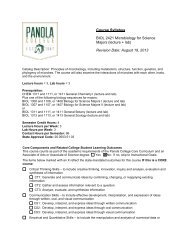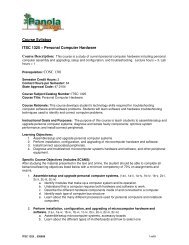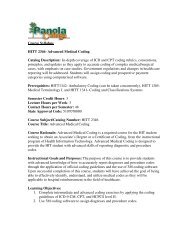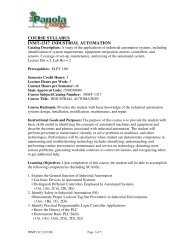Course Syllabus POFT 1301 â Business English - Panola College
Course Syllabus POFT 1301 â Business English - Panola College
Course Syllabus POFT 1301 â Business English - Panola College
You also want an ePaper? Increase the reach of your titles
YUMPU automatically turns print PDFs into web optimized ePapers that Google loves.
SCANS CRITERIA<br />
1) Foundation skills are defined in three areas: basic skills, thinking skills, and personal<br />
qualities.<br />
a) Basic Skills: A worker must read, write, perform arithmetic and mathematical operations, listen,<br />
and speak effectively. These skills include:<br />
i) Reading: locate, understand, and interpret written information in prose and in documents<br />
such as manuals, graphs, and schedules.<br />
ii) Writing: communicate thoughts, ideas, information, and messages in writing, and create<br />
documents such as letters, directions, manuals, reports, graphs, and flow charts.<br />
iii) Arithmetic and Mathematical Operations: perform basic computations and approach practical<br />
problems by choosing appropriately from a variety of mathematical techniques.<br />
iv) Listening: receive, attend to, interpret, and respond to verbal messages and other cues.<br />
v) Speaking: Organize ideas and communicate orally.<br />
b) Thinking Skills: A worker must think creatively, make decisions, solve problems, visualize, know<br />
how to learn, and reason effectively. These skills include:<br />
i) Creative Thinking: generate new ideas.<br />
ii) Decision Making: specify goals and constraints, generate alternatives, consider risks, and<br />
evaluate and choose the best alternative.<br />
iii) Problem Solving: recognize problems and devise and implement plan of action.<br />
iv) Visualize ("Seeing Things in the Mind's Eye"): organize and process symbols, pictures,<br />
graphs, objects, and other information.<br />
v) Knowing How to Learn: use efficient learning techniques to acquire and apply new knowledge<br />
and skills.<br />
vi) Reasoning: discover a rule or principle underlying the relationship between two or more<br />
objects and apply it when solving a problem.<br />
c) Personal Qualities: A worker must display responsibility, self-esteem, sociability, selfmanagement,<br />
integrity, and honesty.<br />
i) Responsibility: exert a high level of effort and persevere toward goal attainment.<br />
ii) Self-Esteem: believe in one's own self-worth and maintain a positive view of oneself.<br />
iii) Sociability: demonstrate understanding, friendliness, adaptability, empathy, and politeness in<br />
group settings.<br />
iv) Self-Management: assess oneself accurately, set personal goals, monitor progress, and<br />
exhibit self-control.<br />
v) Integrity and Honesty: choose ethical courses of action.<br />
2) Workplace competencies are defined in five areas: resources, interpersonal skills,<br />
information, systems, and technology.<br />
a) Resources: A worker must identify, organize, plan, and allocate resources effectively.<br />
i) Time: select goal-relevant activities, rank them, allocate time, and prepare and follow<br />
schedules.<br />
ii) Money: Use or prepare budgets, make forecasts, keep records, and make adjustments to<br />
meet objectives.<br />
iii) Material and Facilities: Acquire, store, allocate, and use materials or space efficiently.<br />
Examples: construct a decision time line chart; use computer software to plan a project; prepare a<br />
budget; conduct a cost/benefits analysis; design an RFP process; write a job description; develop<br />
a staffing plan.<br />
b) Interpersonal Skills: A worker must work with others effectively.<br />
i) Participate as a Member of a Team: contribute to group effort.<br />
ii) Teach Others New Skills.<br />
iii) Serve Clients/Customers: work to satisfy customer's expectations.<br />
6


